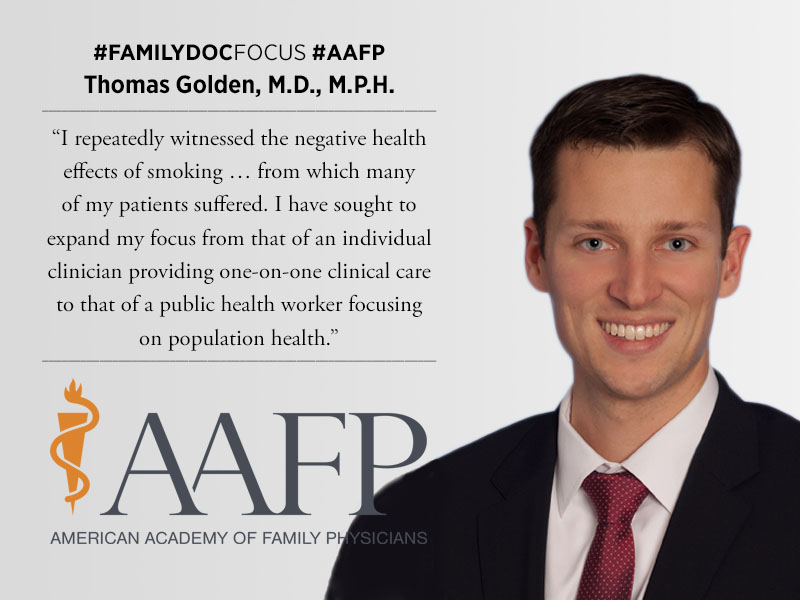Passion for Public Health, Epidemiology Led to CDC Fellowship
May 17, 2021, 2:00 p.m. David Mitchell — The courses Thomas Golden, M.D., M.P.H., enjoyed most as a student at Rutgers University’s Robert Wood Johnson Medical School were public health and epidemiology. Four years after graduation, he’s still studying both as a fellow in the CDC’s Epidemic Intelligence Service.

Each EIS officer is assigned to an office within the CDC and assists the agency’s responses to public health crises both domestically and internationally. Golden works in the Office on Smoking and Health in the CDC’s National Center for Chronic Disease Prevention and Health Promotion. Nearly halfway through a two-year program, he analyzes and interprets epidemiologic data, works with surveillance systems, and develops messaging for public and health care audiences in an effort to advance the CDC’s mission to protect the public’s health and reduce the burden of tobacco-related death and disease.
“I repeatedly witnessed the negative health effects of smoking through the serious, chronic health conditions and related hospitalizations from which many of my patients suffered,” Golden said. “I have sought to expand my focus from that of an individual clinician providing one-on-one clinical care to that of a public health worker focusing on population health. The clinical perspective has proven incredibly useful to my experience thus far, as I gained an understanding of the challenges facing those who wish to quit smoking throughout residency. In my role at CDC, I am working to incorporate that clinical perspective into research and guidelines targeted at the broad population.”
Golden’s interest in medicine and public health started early.
“From the time I first understood the concept of choosing a career, I have always wanted to be a doctor,” he said. “My mother, a nurse, told me when I was very young that she thought I would make a good doctor and the seed planted, then took root.”
As an undergraduate at the University of North Carolina, Golden spent a semester participating in a research project that assessed the incidence of gastric cancer in rural communities in Nicaragua. Golden said that experience highlighted the importance of geographic health disparities and stimulated his interest in public health. He later pursued a master of public health degree between his third and fourth years of medical school at University College Cork in Ireland.
“All of my great-grandparents were immigrants to the United States from Ireland, and we are still in regular correspondence with a number of our relatives who live there,” he said. “It had always been a dream of mine to live and study in Ireland, and it was a phenomenal experience.”
It also gave Golden, an English major who speaks Spanish and French fluently (as well as basic Irish and Portuguese), a chance to work on another language. Golden later completed his family medicine residency training in Greeley, Colo., which has a large immigrant and refugee population.
“These language skills have helped me immensely as a doctor,” he said. “Being able to speak with patients in a language they understand improves trust, communication and efficiency in a clinical encounter.”
Golden said he also received excellent clinical training in pediatrics, inpatient medicine, obstetrics and more as a resident at North Colorado Family Medicine’s Sunrise Training Track in Greeley, but he wanted to do more for patients and his community.
“Throughout residency, I was continuously frustrated by what I perceived as systemic and structural barriers to health that I could not adequately address in a 15-minute clinical encounter,” he said. “Given this frustration and renewed interest in addressing health on a population-based scale, I applied for the CDC’s Epidemic Intelligence Service at the beginning of my final year in residency.”
Golden isn’t sure what his next stop will be, but he has another year to figure that out.
“I would like to continue clinical practice in some capacity,” he said. “However, I would also like to continue my work in public health and research, especially as this pertains to tobacco control and policy. The clinical and public health perspectives can be complementary; experience with one field can inform and improve execution of the other field.”
Whatever Golden does, his training in family medicine will provide the foundation. He said he knew family medicine was the specialty for him before he even started medical school. After graduating from college in December 2011, he spent six months working as an emergency room technician in Jackson, Miss., where his wife was working as a fellow with Teach for America.
When Golden wasn’t working the night shift at the hospital, he volunteered and shadowed physicians at Delta Health Center, the nation’s first federally qualified community health center.
“I witnessed family doctors practicing full-scope medicine in a rural setting, caring for all kinds of patients across the lifespan,” he said. “They provided prenatal, pediatric, adult, and geriatric care. Some of them delivered their prenatal patients at the nearby hospital. When I started medical school several months later, I knew I wanted to pursue family medicine training in residency.”
The application period for the CDC's Epidemic Intelligence Service is open through June 11.